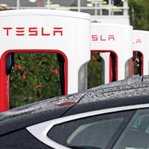Bicycling or driving a hybrid like a Prius (aka"Pious") have become not only passé but déclassé. All-electric vehicles pack the triple entendre of (a) conspicuous consumption, (b) anti-carbon zealotry, and (c) 'afforability' through government subsidy. How progressive. No matter that the $7,500 per vehicle subsidies are carried on the backs of the common folk.
Among electric vehicles, there's nothing higher in the pecking order than a Tesla. Will special supercharging stations be promoted here for them? WE wouldn't be surprised a bit to see that happen... Read on.

A plan for keeping up with the Teslas.
October 17, 2016 | By CAMERON SMITH
Greenville, Alabama, is a small city of about 8,000 right off I-65, south of Montgomery. It’s best known for Bates House of Turkey, a popular lunch stop on the way down to the white-sand beaches of the Gulf Coast. It's also an important stop on the map for Tesla owners.
During a business trip, I happened to stay at the Greenville Hampton Inn. Arriving late at night, I saw a phalanx of gleaming white sentinels standing beneath the humming lights of the parking lot. My first reaction was to wonder if aliens had established a spaceport in Greenville. (It wouldn't be unreasonable for Bates's turkey to have an interstellar cult following.) Upon further inspection, I noticed the word "TESLA" in red letters on each of the six slender machines.
These were "superchargers," a new sort of electrical fuel pump that gives a Tesla electric car a battery charge, in just 30 minutes, sufficient to get to the next charging station. Limited range being the single biggest drawback of plug-in electric vehicles, Tesla is tackling that problem head-on: Instead of waiting for gas stations to build the electric infrastructure, the company is providing its customers with their own network of charging stations across the country.
Tesla's charging infrastructure is crucial for the vehicles to be able to drive cross-country. But the "supercharger" stations, like so much in the world of electric vehicles, are buoyed by federal tax credits and, in many parts of the country, state incentives too. Conservatives have been dubious about plug-in electric vehicles given the policy experience they've had with them thus far, which has all been about government meddling in markets. There's no shortage of subsidies and tax incentives for buying electric. Buy a plug-in vehicle and the federal government picks up $7,500 of the cost through an income tax credit. It's hard to justify such subsidies—particularly for products such as Teslas that most people can't afford even after taxpayer help.
The hope is that by expanding its charging network, Tesla will expand its customer base to the point that the subsidies will no longer be needed for the business to make sense.
But even if it does, Tesla's supercharging stations only serve its own customers. If average Americans want to buy an electric vehicle, there isn't a network of superchargers to serve their needs. That makes electric vehicles less practical. Consumers' choices are limited not by technology, but by infrastructure.
For all the progress that has been made with plug-in technology, electric cars may not be beyond the need of incentives to sell at all. Take the Nissan Leaf, the bestselling all-electric vehicle in America. With a base price of slightly less than $30,000 before all the subsidies, it doesn't have much range, just some 84 miles per charge. By comparison, Nissan's Altima costs $7,000 less and can drive cross-country, stopping only for quick gasoline fill-ups. The Leaf limps along with 107 horsepower; the Altima's base-model four-cylinder engine produces 182 horsepower. It's a measure of the market's eagerness for electric cars that they have sold at all.
How do the makers of electric vehicles compare with other disruptive technology companies? Uber and Lyft have radically disrupted the taxi and limousine business. Airbnb is a force in hospitality. But these these new businesses have done their disruption without government subsidies—indeed, in the case of Uber and Lyft, much of their progress has been accomplished in the face of government regulators trying to hobble them.
But if we want to see a functioning free market in electric vehicles, one free from distorting subsidies, credits, and incentives, we should at the very least look to remove federal regulations that throw up unnecessary roadblocks to the new technology.
For example, an obvious place to install electric-vehicle chargers is at highway rest stops. But such commercial charging stations would be against federal law. Section 111 of Title 23 of the U.S. Code severely restricts commercial activity at interstate rest stops (with exceptions for service plazas built before 1960), limiting rest-stop commerce to such things as vending machines and travel information.
Why not allow charging stations at rest stops, permit providers to charge customers, and generate tax revenue in the process? Electric-vehicle drivers would have a predictable, secure, familiar location to charge their cars on lengthier trips. And instead of subsidizing the stations, governments might charge rent. It would be a bipartisan change: Republicans could support cutting government restrictions on commerce and Democrats could support emission-free vehicle technology without pushing yet another subsidy.
We ought to look for ways to free the marketplace and encourage competition by removing hurdles to innovation. It's a harder path than subsidies or tax credits, but it's the difference between eradicating market distortions and imposing new ones.
Cameron Smith is state programs director and general counsel for the R Street Institute, a Washington, D.C.-based free market think tank.

 RSS Feed
RSS Feed
